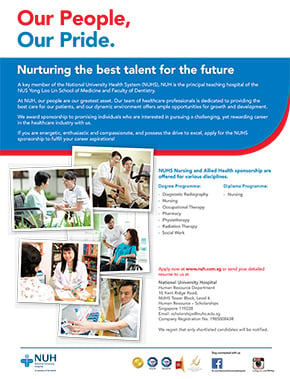While doctors and nurses form the frontline of medical healthcare, Allied Health Professionals (AHPs) like medical social workers, podiatrists and therapists form the muscle of the healthcare industry. Working closely with multi-disciplinary stakeholders, AHPs provide a wide range of health services which help ensure a seamless road to recovery for all patients.
Fung Xinhui, a Senior Speech Therapist with the National University Hospital (NUH), a member of the National University Health System (NUHS), tells us more about her fulfilling role and journey towards a career in speech therapy.
What motivated your decision to pursue a career in the healthcare sector?
Fung Xinhui: During my schooling days, I was involved in many school-initiated volunteering programmes. I thoroughly enjoyed every visit made to the nursing homes or special schools, and found the entire experience to be very rewarding. It was clear to me at that point that I wanted a career which would allow me to help others as it would give me a great sense of satisfaction and fulfilment. Working in the healthcare sector would definitely give me the opportunity to do so.
After attending various career and scholarship fairs, I developed a particular interest in speech therapy as it dealt with communication and swallowing difficulties – two integral parts of our lives. I was fortunate enough to have had the opportunity to observe the speech therapists at work in NUH and was greatly inspired by them.
Pursuing an education in speech therapy became my eventual choice, and I chose a scholarship with NUHS as it allowed me the opportunity to work with children and adults.
What are some of the roles and responsibilities you hold as a Speech Therapist?
Xinhui: As a speech therapist, my roles and responsibilities circle around providing clinical care to patients who have swallowing and communication difficulties. My patients suffer from various conditions such as changes to the brain (e.g. stroke, traumatic head injuries, dementia, etc.), cancer, road traffic accidents, and respiratory issues.
Being stationed at the acute hospital wing, a large part of my job comprises of assessing a patient’s swallowing function. I help determine if he is safe to take food and drink orally and to recommend the diet textures and fluid consistencies that would be best tolerated. This is done through assessments which range from a simple bedside test to sending the patient for further testing via videofluoroscopy or a fibreoptic endoscopic evaluation. Based on the assessment’s results, I can tailor exercises to improve the patient’s swallowing function if he is fit for rehabilitation.
It is also important to educate patients, their family, and caregivers about their swallowing and communication difficulties so that they can cope with managing these impairments when they are eventually discharge back home.

Fung Xinhui
Healthcare Scholar
Senior Speech Therapist
National University Hospital
Share with us about some memorable episodes you have had during your career.
Xinhui: Helping a patient who lost his speech to be able to regain functional speech or to communicate via augmentative or alternative forms of communication, or helping a patient who was unable to eat to be able to do so again are the most rewarding for me.
Among them, was an elderly patient who was diagnosed with nasopharyngeal cancer. Due to radiation therapy for his cancer treatment many years back, his swallowing function had worsened and the prognostication was that he would not be able to consume food again.
However, he expressed that being able to eat was one of this greatest joys in life and his one wish was to be able to consume small amounts of food and drink orally. Even after I explained that therapy outcomes may be limited given his medical condition, he was insistent in undergoing a trial of rehabilitation. After months of hard work, his motivation finally paid off and he was able to consume small amounts of food and drink safely again. I will always remember the tears of joy on his face when he was told of the news.
This particular patient taught me a very important lesson of not giving up on patients who have the determination to make improvements. Based on professional judgement, there are times when we are certain that favourable therapy outcomes are limited. However, miracles can really happen for patients who have the willpower to achieve improvements.
Any advice for those who are considering a healthcare scholarship?
Xinhui: I would advise them to be absolutely sure that they have a genuine passion in helping others. It may not be a financially rewarding career, but the takeaways are tremendous.
As healthcare jobs are very specialised, be sure that to have done your research on all possible professions. Attend scholarship and career fairs and seek observation opportunities or internships to gain a better understanding of what each job entails. This will help you in deciding which job you are best fitted for.
Lastly, be sure that you understand the terms of the scholarship and do not take one up if you do not think you can fulfil it. Having a scholarship does not mean that you are on an accelerated path in your career - career progression will still be very much determined by job performance.

